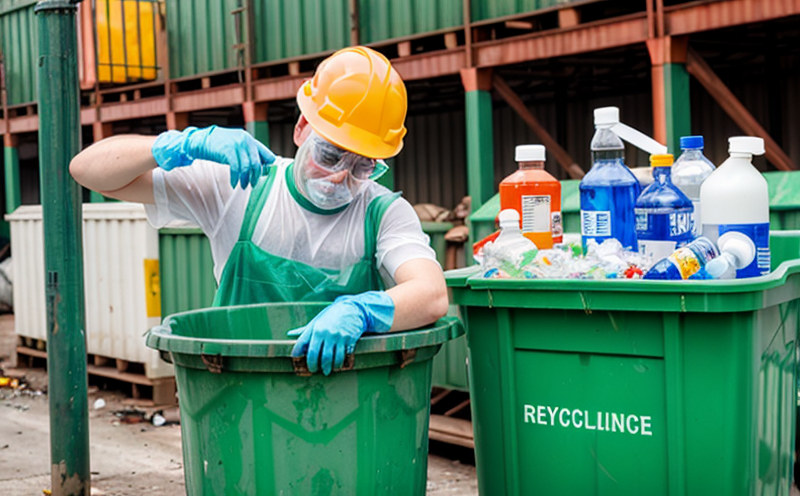GB T 34370 Chemical Testing of Recycled Plastics
The GB/T 34370 standard provides a comprehensive framework for chemical testing of recycled plastics, ensuring the safety and quality of these materials in various applications. This standard is crucial as it sets out specific requirements to identify potential contaminants that could affect product performance or pose environmental risks.
GB/T 34370 applies to all types of recycled plastics used in manufacturing processes where chemical integrity is paramount, such as automotive components, packaging materials, and construction products. The standard ensures that recycled plastics meet the same stringent quality criteria expected from virgin materials. This not only promotes sustainable practices but also enhances the reliability and safety of end products.
The testing parameters outlined in GB/T 34370 include a range of chemical analyses aimed at identifying harmful substances like heavy metals, organic solvents, and other potential contaminants. These tests ensure that recycled plastics are free from substances that could lead to degradation over time or pose health hazards when used in consumer goods.
The specimen preparation process for GB/T 34370 involves careful selection of representative samples that accurately reflect the characteristics of the batch of recycled plastic being tested. This step is critical as it ensures that the test results are reliable and applicable to the entire batch. Once prepared, these specimens undergo rigorous chemical analysis using advanced spectroscopy techniques and chromatography methods.
The instrumentation used in GB/T 34370 testing includes atomic absorption spectrophotometers for heavy metal detection, gas chromatographs for volatile organic compound identification, and Fourier Transform Infrared (FTIR) spectrometers for structural characterization. These instruments provide precise measurements that help determine compliance with the standard’s limits.
The acceptance criteria specified in GB/T 34370 are designed to ensure that recycled plastics meet specific chemical purity thresholds. Compliance is determined by comparing test results against these predefined standards, which vary depending on the type of plastic and its intended use. For instance, medical-grade plastics have stricter limits for certain contaminants compared to agricultural or industrial applications.
By adhering to GB/T 34370, manufacturers can demonstrate their commitment to environmental responsibility while maintaining product quality. This standard supports sustainable development by encouraging the reuse of valuable resources and reducing waste in landfills. Additionally, it helps protect public health by minimizing exposure to hazardous chemicals through regulated recycling practices.
The implementation of GB/T 34370 also facilitates market access for recycled plastic products by aligning them with international standards like ISO 14001 and ISO 9001, which focus on environmental management systems and quality management respectively. This alignment enhances confidence among buyers and stakeholders regarding the safety and sustainability attributes of recycled plastics.
In conclusion, GB/T 34370 plays a vital role in ensuring that recycled plastics meet rigorous chemical testing requirements. Its comprehensive approach guarantees the integrity and safety of these materials across various sectors, promoting both environmental stewardship and product reliability.
Why It Matters
The significance of GB/T 34370 chemical testing lies in its ability to safeguard public health and protect the environment. By rigorously checking for harmful chemicals, this standard ensures that recycled plastics are safe for use in consumer products and industrial applications alike.
Public health is directly impacted by the presence of contaminants within materials used in everyday items such as toys, furniture, and medical devices. Ensuring these components are free from hazardous substances reduces risks associated with prolonged exposure or accidental ingestion. Similarly, protecting the environment involves preventing harmful pollutants from entering ecosystems through improper disposal methods.
The broader implications extend beyond individual consumers to encompass entire industries reliant on recycled plastics for sustainability initiatives. Companies adopting GB/T 34370 demonstrate their dedication to corporate social responsibility (CSR), thereby enhancing brand reputation and customer loyalty. Moreover, compliance with such standards fosters trust among regulatory bodies who oversee industry practices.
In summary, the importance of GB/T 34370 chemical testing cannot be overstated—it serves as a critical tool for maintaining both human well-being and ecological balance in our increasingly interconnected world.
Benefits
- Increased Safety: Ensures that recycled plastics do not contain harmful substances, protecting users from potential health risks.
- Enhanced Reliability: Guarantees consistent quality across batches of recycled plastic, which is crucial for maintaining product performance and longevity.
- Sustainable Practices: Supports the recycling industry by promoting responsible use of materials and reducing waste generation.
- Better Reputation: Demonstrates a company’s commitment to environmental responsibility and ethical business practices.





